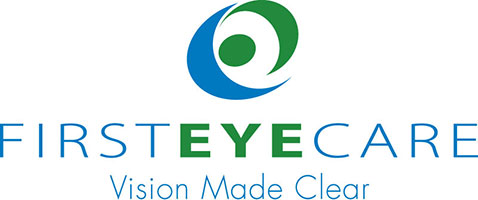
Keratoconus is a common eye condition that results from an irregularly shaped cornea. When this happens, light is unable to focus correctly on the retina. In individuals who have keratoconus, the cornea becomes thin and shaped more like a cone, resulting in blurry vision and sensitivity to light.
Unfortunately, there is no known cause of keratoconus. There are many different theories out there, with some experts believing pre-existing medical conditions, heredity, allergies, and eye rubbing all contribute to a person’s chance of developing it. It is a very gradual, slow-moving disease, typically first showing up in the late teens or early twenties. Because we are unsure of why keratoconus develops, coming into First Eye Care for a comprehensive eye exam is your best bet. One of our knowledgeable eye care professionals will be able to evaluate your eyes and determine the presence of keratoconus simply by looking at the surface of the cornea through corneal topography. This is a pain-free evaluation that will give you a great deal of knowledge about the overall health of your eyes and vision.
Symptoms of Keratoconus
When keratoconus first starts to develop, it may result in slightly blurred or distorted vision. Over time and as the disease progresses, vision will become more and more distorted. If you notice your eyeglass or contact prescription seems to be changing rapidly, it could mean you are suffering from keratoconus. Additional symptoms of this common eye condition include:
- Distorted vision, at both near and far distances
- Glare
- The appearance of several images when looking at one object (known as “ghost” images)
- Multiple changes to glasses or contacts prescription
Treatment for Keratoconus
For many people, contact lenses or eyeglasses are an effective treatment for keratoconus. However, as the disease progresses, the following may be necessary:
- Custom soft contact lenses- These are specially-designed soft contact lenses that can help correct keratoconus
- Gas permeable lenses- Gas permeable (GP) lenses can correct the irregular cornea associated with keratoconus by covering or masking it
- Scleral contact lenses - These larger diameter lenses are a great treatment option because they cover the entire cornea
- Eye surgery- If contact lenses are not correcting symptoms associated with keratoconus, surgery may be an option



